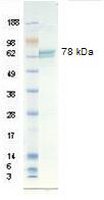Caught in the matrix: how vitronectin controls neuronal differentiation.
Wechsler-Reya, R J
Trends Neurosci., 24: 680-2 (2001)
2001
Afficher le résumé
Cerebellar granule cells are the most abundant neurons in the brain and are crucial to the circuitry that controls motor coordination. The proliferation of granule cell precursors (GCPs) is controlled by the secreted signaling molecule Sonic hedgehog (Shh), but the factors that regulate GCP differentiation remain a mystery. A recent study suggests that the extracellular matrix protein vitronectin might tell GCPs when to stop dividing and begin differentiation. | 11718852
 |
Vitronectin.
Schvartz, I, et al.
Int. J. Biochem. Cell Biol., 31: 539-44 (1999)
1998
Afficher le résumé
Vitronectin is a multifunctional glycoprotein present in blood and in the extracellular matrix. It binds glycosaminoglycans, collagen, plasminogen and the urokinase-receptor, and also stabilizes the inhibitory conformation of plasminogen activation inhibitor-1. By its localization in the extracellular matrix and its binding to plasminogen activation inhibitor-1, vitronectin can potentially regulate the proteolytic degradation of this matrix. In addition, vitronectin binds to complement, to heparin and to thrombin-antithrombin III complexes, implicating its participation in the immune response and in the regulation of clot formation. The biological functions of vitronectin can be modulated by proteolytic enzymes, and by exo- and ecto-protein kinases present in blood. Vitronectin contains an RGD sequence, through which it binds to the integrin receptor alpha v beta 3, and is involved in the cell attachment, spreading and migration. Antibodies against alpha v beta 3 or synthetic peptides containing an RGD sequence are now being tested as therapeutic agents in the treatment of human cancers, bone diseases (e.g. osteoporosis) and in pathological disorders which involve angiogenesis. | 10399314
 |











